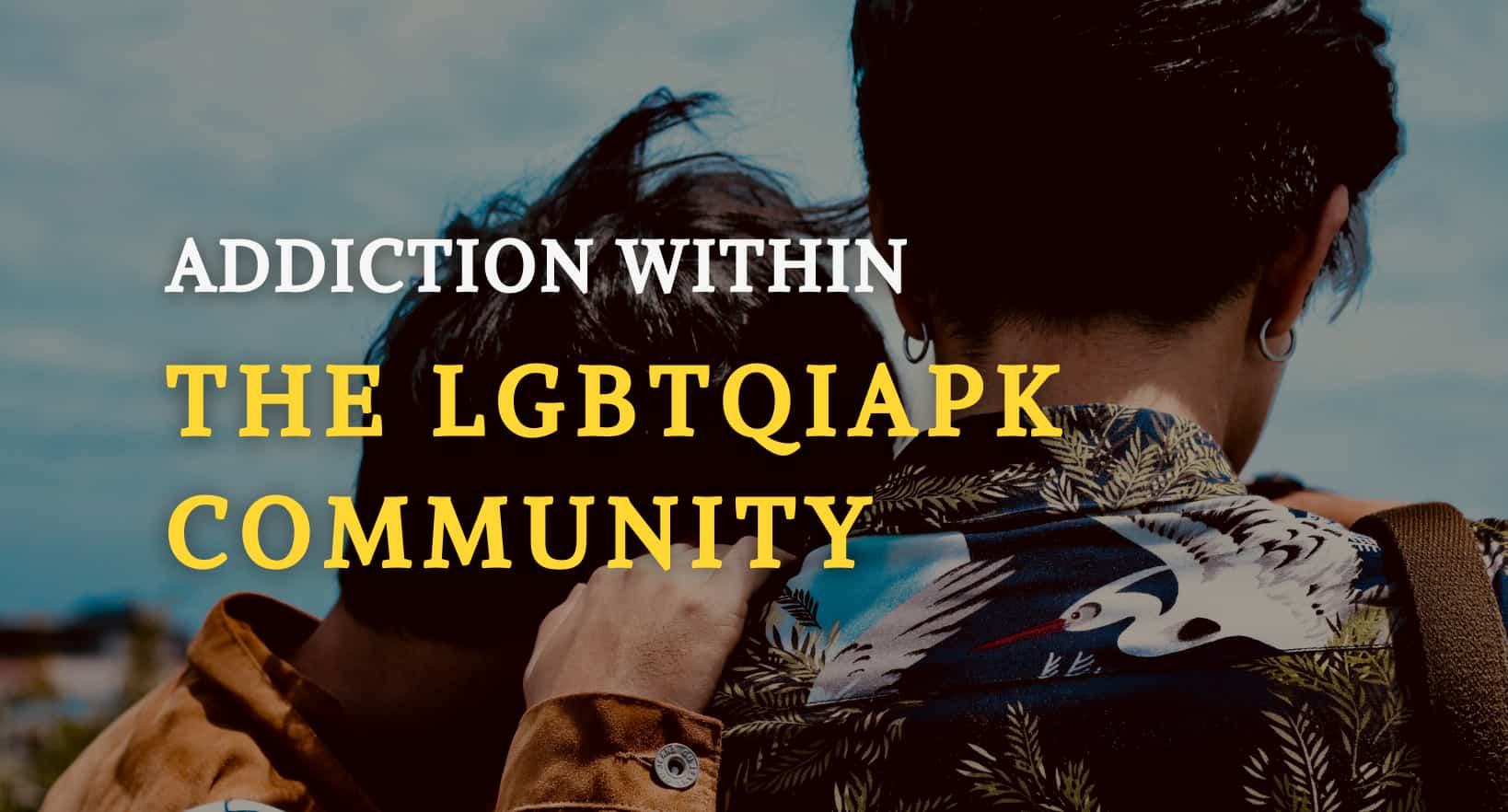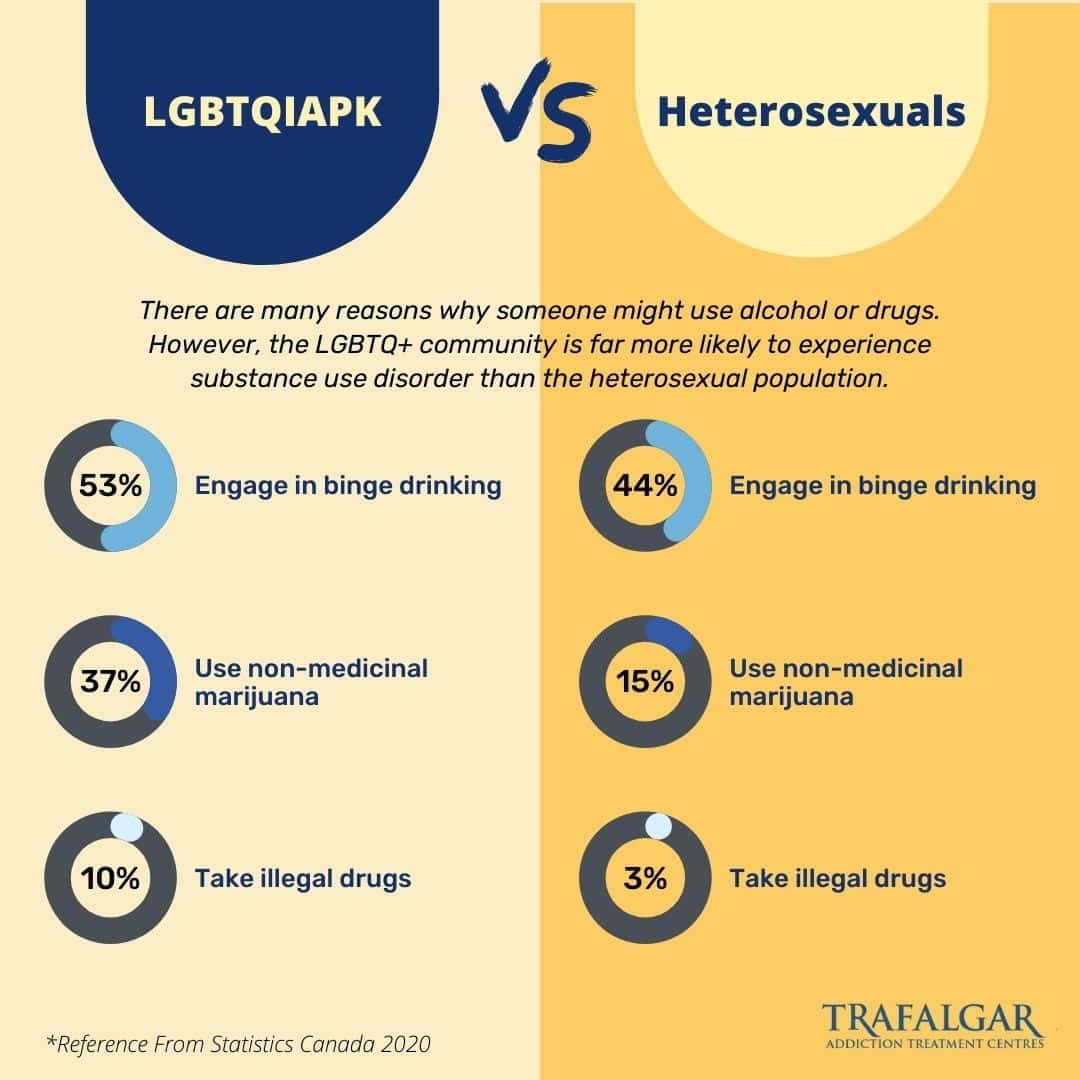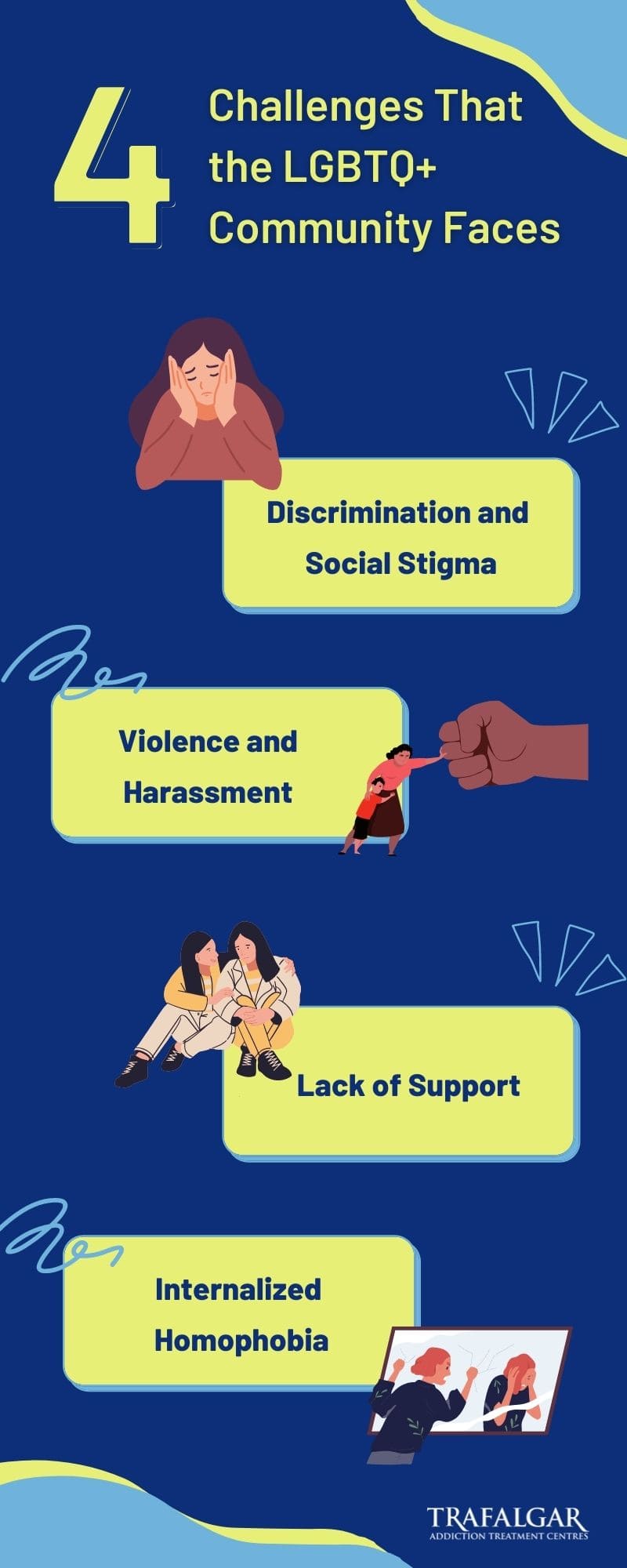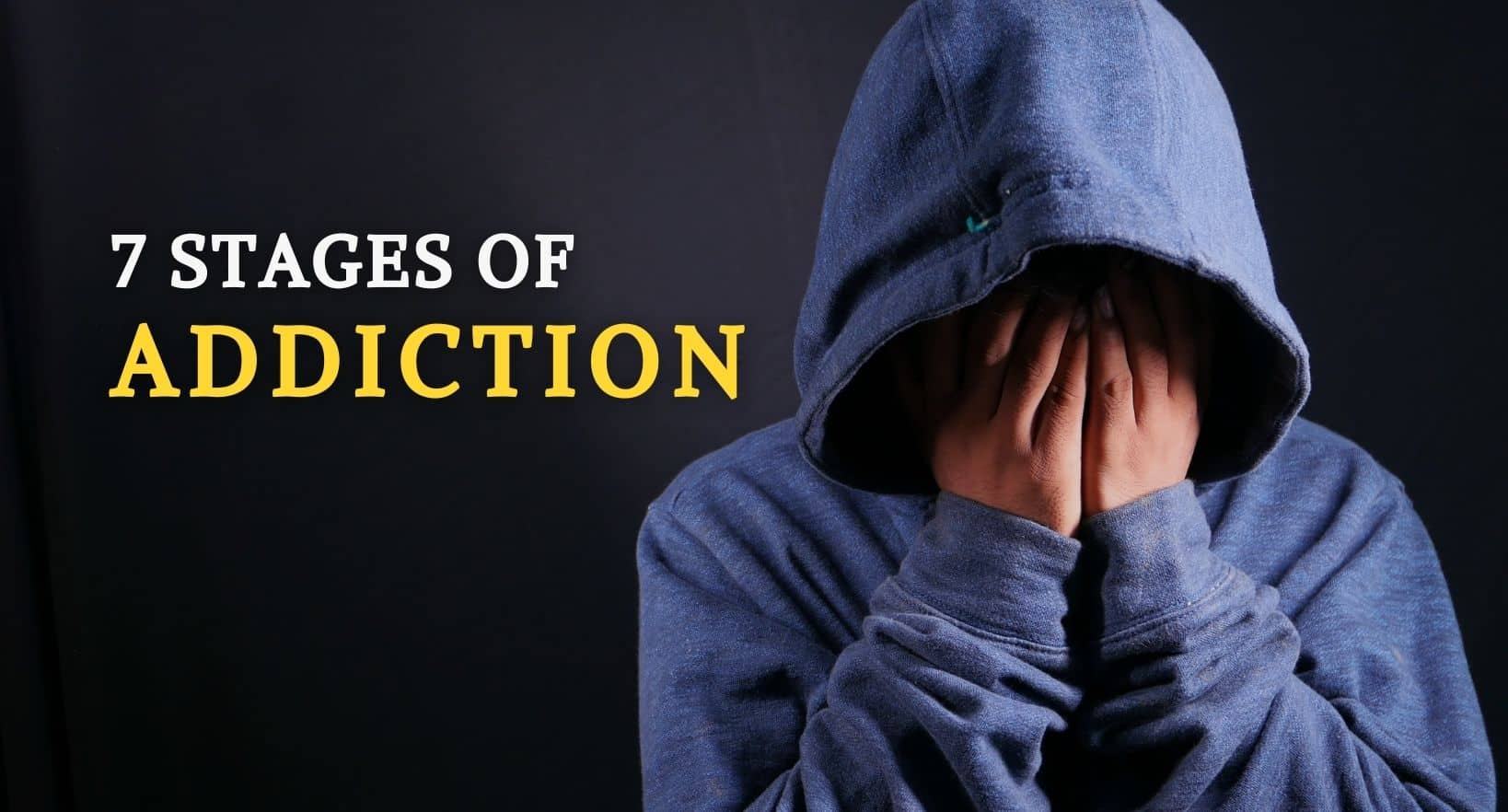

By Trafalgar’s Editorial Team
This Content is Clinically Reviewed By Kinga Burjan M.A., R.P.
Substance use disorder soars at shockingly high rates within the LGBTQIAPK community.
Addiction is a disease that doesn’t discriminate. Anyone who uses harmful substances like alcohol and drugs is at risk of becoming dependent at any point in their life. However, people who identify as LGBTQIAPK are more likely to struggle with addiction overall. Why is that?
One of the major reasons is, while each individual within the LGBTQIAPK (Lesbian, Gay, Bisexual, Transgender, Queer or Questioning, Intersex, Asexual, Pansexual, Kink) community is unique and diverse, they are at an increased risk for mental health issues when compared to the rest of the population.
Discrimination, harassment, and lack of support are just some of the reasons why individuals may experience issues with poor mental health. These mental health issues often go hand-in-hand with drug or alcohol use disorder, known as concurrent disorders.
When issues like depression and anxiety are coupled with substance abuse, it can become a vicious cycle that is hard to break.
When a mental health issue goes untreated, the substance abuse usually worsens. At the same time, when substance abuse worsens, the mental health issue often gets worse. Neither of these issues will get better if they’re simply ignored — they’ll likely continue to snowball and keep getting worse as time goes on.
If you’ve been struggling with substance abuse disorder and mental health issues, it’s important to know that you don’t have to face it alone. There are so many people out there who are facing many of the same daily battles that contribute to poor mental health and substance use disorder.
In addition, there are treatment options and support groups that are welcoming of the LGBTQIAPK community and support people from all walks of life.
In this article, we’ll dig deeper into the challenges that the LGBTQ+ community faces, and you’ll discover which concurrent disorders are the most common, as well as the various treatment options available to you as an LGBTQIAPK individual.
4 Challenges That the LGBTQ+ Community Faces
There are countless of reasons why someone might use alcohol or drugs. However, as we mentioned at the start of this article, the LGBTQ+ community is far more likely to experience substance use disorder than the heterosexual population.
According to statistics, when compared to heterosexual Canadians, LGBTQIAPK individuals are more likely to:
- Engage in binge drinking (53% versus 44%)
- Use non-medicinal marijuana (37% versus 15%)
- Take illegal drugs (10% versus 3%)

These numbers speak for themselves. While it’s not hard to see why any person might turn to alcohol and drugs use to cope with the challenges of daily life, certain factors put LGBTQ+ people at greater risk.
A common challenge that can take a toll on a queer person’s mental health includes deciding whether or not to “come out”.
The pressure to hide or reveal one’s true identity can be devastating, often leading to problematic behaviour patterns and unhealthy coping mechanisms, like alcohol or drug use.
However, deciding whether or not to come out is not the only concern. Some of the other challenges this community faces in general include:
1) Discrimination and Social Stigma
As far as we have come as a whole, discrimination and homophobia against LGBTQIAPK people still exist in Canada. When these unfair and negative beliefs are projected onto people who are simply trying to live as their authentic selves, the effects can take a toll on a person’s mental and physical wellbeing.
Simply being treated differently by society can have a negative mental impact on a person from a young age. Although some people may not experience depression or other mental health conditions because of discrimination and social stigma, many will be under higher emotional distress daily.
This also extends far beyond just problems with social inclusion and feeling misunderstood.
Sometimes exclusion and discrimination against an individual’s identity can limit their access to important economic resources. For example, one Ontario study found that Canadian transgender people struggle to live on salaries of $15,000 or less, making them the lowest-earning Canadians. The statistics are staggering, yet they provide insight into the challenges that so many minorities face.
As a whole, people within the LGBTQ+ community experience more issues landing jobs, keeping a roof over their heads, and getting access to quality health care. Gay men and transgender people commonly report foregoing medical treatment when it’s needed due to fear of discrimination from their healthcare provider. Unfortunately, no matter where someone falls under the queer umbrella, this harsh reality can be true for any individual.
2) Violence and Harassment
Violence and harassment are all too common for sexual minorities. Bullying within the school system, at work, in public, and online can dramatically impact youth’s mental health and self-esteem from early on.
Sometimes the bullying is subtle and goes unreported — at times carrying on throughout a person’s lifetime. Unfortunately, the harsh reality is that what was once problematic bullying can progress into hate crimes.
In comparison to the cisgender population, the transgender community faces an even higher rate of violence and harassment because of their identity. Trans women of colour have been exceptionally prone to violent hate crimes.
This knowledge alone is enough to keep someone living in a state of unease. It’s no wonder that using alcohol or drugs to cope with physical violence or sexual assault can become the norm if other healthy tools aren’t learned.

3) Lack of Support
While it’s true that not everyone has the luxury to be born into a supportive family — gay, straight, and anything in between — many people in the LGBTQIAPK community face an even greater lack of support.
While it’s a parent or guardian’s job to nurture their child’s well-being, sometimes this is not the case if a parent can’t come to terms with their child’s sexuality or identity. This is often due to their belief system that they have learned from their parents or society.
When a person is rejected or abandoned by family members because of their identity, lifestyle or preferences, it can be devastating. Yet, it’s a common problem that queer youth and adolescents face.
This is why so many people choose to keep quiet about their identity and choose to live “in the closet”, causing even greater inner turmoil as they suppress who they are. Even as an adult, being estranged from the ones who are supposed to love you the most can harm your well-being. It can be traumatizing.
4) Internalized Homophobia
Some individuals within the LGBTQ+ community also struggle with internalized homophobia. In a society that teaches heterosexuality as “the norm”, many queer people internalize their own negative thoughts and perceptions about who they are.
Sometimes these beliefs are learned from parental figures and other times it’s the messages receive from society daily. Regardless of the reason, this is a common reason why so many people find it difficult to come to terms with their own identity.
The truth is, there is no “correct” way to be. Even still, a lack of self-acceptance can begin to manifest itself as self-loathing as time goes on. This internalized homophobia is a major reason why so many people within the LGBTQIAPK community are more likely to experience mental health issues and substance use disorder.
Denying your true identity to yourself and others can be detrimental to your self-esteem, body image, and mental well-being. Substances may take the edge off temporarily, but they will only worsen the state of your mental health even further. This is no way to live.
Substance Addictions and Co-Occurring Addictions for LGBTQ+ People
Facing issues like the ones we mentioned above, sometimes the only places that feel truly safe are queer-friendly bars, where alcohol and drug use is rampant.
People will often start spending time with the wrong crowd because they feel the most accepted. However, that doesn’t mean they have your best interest at heart or that it’s a healthy environment to be in.
Excessive alcohol use in gay bars and queer-friendly venues often paves the way for alcoholism in LGBTQ+ people. Not only is it glamourized and easily accessible, but many people also report finally feeling free of their inhibitions and being able to act like their true selves when drinking in excess.
Up to 25% of the LGBTQ+ community reports having moderate to severe dependency on alcohol. That’s a quarter of the entire queer population. The statistics among bisexual women are often even higher. Social stigma against bisexual people — even within the LGBTQ+ community — is often to blame.
And it doesn’t stop there — alcohol use goes hand-in-hand with co-occurring addictions. Queer people are up to 200% more likely to use tobacco than the heterosexual population.
Some of the other most commonly used substances within the community include (but aren’t limited to) cannabis, cocaine, ecstasy, amphetamines, and opiates. Mixing any of these drugs can have a detrimental and at times, lethal effect.
The risk of substance use disorder is even higher when it comes to the BIPOC (Black, Indigenous, and People of Colour) LGBTQ+ community.
As both sexual minorities and minorities in general, these life circumstances can create a challenging start to life for some people. The systemic discrimination that they often face daily can be extremely traumatizing, putting them at even greater risk to rely on drugs and alcohol.
It’s also important to acknowledge that all addictions aren’t substance-related. Other addictions are rampant within the queer community as well.
Some individuals will not only become reliant on substances, but they’ll become addicted to other risky activities such as sex, gambling, and other compulsive behaviours. Some people are more prone to addiction than others based on environmental factors or genetics.
Online Addiction Treatment Programs for
the LGBTQIAPK community
We offer 4-week intensive virtual program:
A New Alternative to Residential Treatment.
And yes, it works.
Call For Price
Help is Available in A Safe and Welcoming Environment
While the LGBTQIAPK community is more likely to face mental health issues and substance use disorder, it’s important to know that it doesn’t have to be that way. No matter what you’re feeling right now, you don’t have to go through this alone.
Even if you don’t have a support system at home, with the right professionals helping you through recovery, you can better manage or overcome co-occurring disorders and get your life back on track.
If you’re worried about what might happen if you ask for help, that’s only natural. You might have concerns about whether the providers and counsellors in rehab will be welcoming of your sexual orientation or gender identity.
Even if you’ve experienced issues like this in the past, it’s important to remember, it doesn’t have to be that way going forward. You have the right to high-quality treatment — we strongly believe that everybody does.
So if you’ve been struggling with substance abuse or mental health issues, we’re here to help. Trafalgar Addiction Treatment Centres is a safe and supportive environment for the LGBTQIAPK community — welcoming people from all walks of life.
We offer both virtual and inpatient treatment options for addictions and concurrent disorders that the LGBTQ+ community commonly faces. Let’s explore the options even further.
Inpatient Residential Program for the LGBTQ+ Community
Are you in need of a supervised program with the highest standard of care?
Then you may want to consider our inpatient program at one of our residential treatment centres. You’ll be welcomed into a safe and private space in our home-like rehab treatment facility. Your stay can last anywhere between 30 to 90 days — or even more, if needed.
You’ll receive one-on-one counselling from our Master’s level registered therapists, daily group therapy, and withdrawal management if needed.
You’ll have the chance to take part in yoga, fitness classes, and other recreational activities to start taking steps toward feeling better each day. You’ll meet plenty of like-minded individuals who are going through the same thing as you and create a solid community in your recovery journey.
Virtual Treatment Programs for the LGBTQ+ Community
Are you looking for treatment without having to leave your job or your kids? Our virtual outpatient program is a flexible and convenient alternative to our top-notch inpatient program at Trafalgar Addiction Treatment Centres.
You’ll receive a personalized online program based on our inpatient program — all from the comfort of home. All you need is a smartphone or computer to get started.
Whichever program resonates most with you, rest assured that we will also help you work through any concurrent mental health issues that you may be facing.
We’ll work through past traumas and underlying issues to help eliminate the substance use and get you on the path to recovery. Not only that, but each program provides the option to receive aftercare to support you for as long as you need.
Remember, no matter how you identify or whom you love, our team’s only goal is to be right there alongside you throughout each step of your recovery journey.
You’ll tackle setbacks together and celebrate each milestone in your recovery with a community of like-minded people at your side. You will be fully supported in every way as you take these steps toward a positive life.
If you’re ready to explore which treatment option would be best for you, get in touch with us at Trafalgar Addiction Treatment Centres today.
Meet Our Renowned Experts
You will receive treatment from the very best.
We have a team of accredited professionals who have many years of clinical and research experience.
Our Rehab Programs
Consult with a professional now to learn how we can help you or your loved one.






